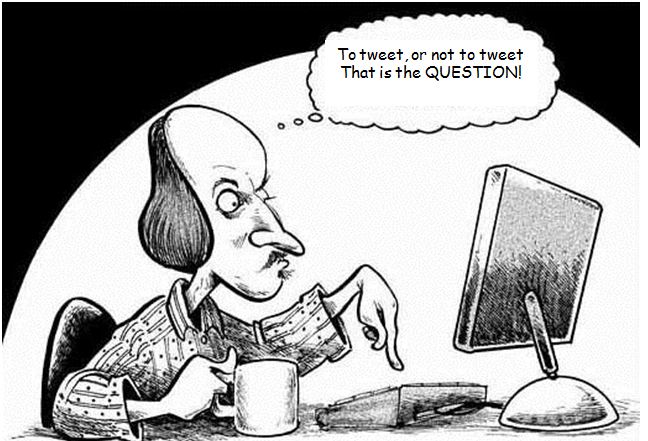Note: This post was published in April, 2011 but became the target of controversy in July 2011 when I learned the person claiming to be the author was not the author. To get the full story, refer to this link: The Great Ghost Post Scandal. It will also help explain some of the comments in the comment section. At the urging of the blog community, I have amended this post to acknowledge the true author.
By William Harwood
Have you ever thought about how great writers of the past would be totally up a creek if they tried to publish today in their original style? Melville? Dostoyevsky? Joyce? They would starve. Imagine an editor in New York opening up an envelope and finding inside a story entitled Great Expectations from some guy named Chuck Dickens.
“To the recycling pile, please,” she would imperiously command after less than a paragraph, tossing the tome to the nearest intern. “This guy Chuckie could use online creative writing schools. I mean, who the heck names a protagonist ‘Pip’?”
But what about the greatest one of all? What if the Bard himself, William Shakespeare, suddenly manifested in the here and now as a wordsmith wanting work? Well, given the opportunities of the times, there’s a good chance he would wind up as a social marketer.
So how would he do it? How would Shakespeare give it to us? Well, in addition to lots of fine examples of iambic pentameter, as we like it: short and sweet. In fact, measure for measure, it might look something like this.
“All’s Sale That Ends Sale”
Dramatis Personae:
- IAGO, a boss
- Sir JOHN FALSTAFF, a salesman
- Prince HAMLET, an intern
- PUCK, a delivery fairy
ACT I SCENE I
Enter Iago in Falstaff’s cubicle where Sir John sits surfing dating sites.
IAGO: How now?! What’s this?! Thou seeketh the shanks of flaming youth while my wares remain unmoved?!
FALSTAFF: Oh, but I am forsworn! Please, Sir, I plead thy pardon. Perhaps one can desire too much of good thing.
IAGO: Hold thy tongue, thou warped rough-hewn maggot pie.
FALSTAFF: Yes, Sir.
IAGO: Thou doth not make love to thy employment and, when it’s thy turn to make the coffee, thou doth protest too much.
FALSTAFF: Sir, infirm of purpose, I know not how to market wares through this infernal social media.
IAGO: Then thou must learn, thou currish toad-spotted mammet! Or, if thou willst not, thou willst have no money in thy purse!
Exeunt
ACT I SCENE II
Falstaff stands by water cooler as Puck makes a delivery to the receptionist nearby.
FALSTAFF: [soliloquy] I am undone! My spotless reputation ruined. What know I of social marketing skills?
PUCK: [winking at the pretty receptionist and nodding toward Falstaff] Lord, what a fool that mortal be.
Enter Prince Hamlet, reading a hook.
HAMLET: Wow! This is it! Impactful messaging must be glance-aware by design!
FALSTAFF: Hamlet boy, thou saucy milk-livered dewberry, why for art thou speaking so strangely? And what art thou reading?
HAMLET: This stuff! Dude, like, it’s a total game changer.
FALSTAFF: How now?
HAMLET: Man, to market effectively through social media, it’s not just about keeping your words short and sweet and using lots and lots of headlines, but about the very design of the information on the screen!
FALSTAFF: [not understanding] Thou art a cur.
HAMLET: [not understanding what the word ‘cur’ means] Huh? No, man, I’m just an intern. But, anyway, studies have shown that visitors to a web site will read information on a screen in the shape of a capital ‘F.’ That means that if you design your most important content in that physical shape, you’re message will be most effective.
FALSTAFF: ‘F’ as in Falstaff?
HAMLET: Yeah, that’s right. Eye-tracking studies in 232 subjects who viewed thousands of web pages determined that people’s reading habits are pretty consistent, regardless of the sites’ purpose or content. Again and again, the pattern of people’s attention as measured by where their eyes go resembles the shape of a capital ‘F.’
FALSTAFF: Clever knave.
HAMLET: So to ‘F’ or not to ‘F’, that is the question. The answer is, like, a no-brainer. Well, yeah!
FALSTAFF: [feeling old and obsolete] Oh, my bladder fills with gall. Were this water cooler filled with wine.
HAMLET: [ignoring Falstaff and thinking aloud] Man, so, like, the challenge is to figure out how we can present our social marketing information in that shape while keeping the power of story. [snaps fingers] Hey, I got it! We could present our products through a play, you know, personifying our merchandise in a tale full of twists and turns. Epic. Call it, like, I don’t know, All’s Sale That Ends Sale.
IAGO: [calling out] Hamlet! I harkened that! My boy, thy star waxes in this organization! Thou willst go far!
HAMLET: Thank you, Sir!
FALSTAFF: Wretch.
Exeunt all but Puck
PUCK: [to audience] And now our play is at end,
The time is over to pretend.
So back to work for all is well.
The time has come to raise your sells.
The End
William Harwood is a freelance writer in Nashville, Tennessee.
